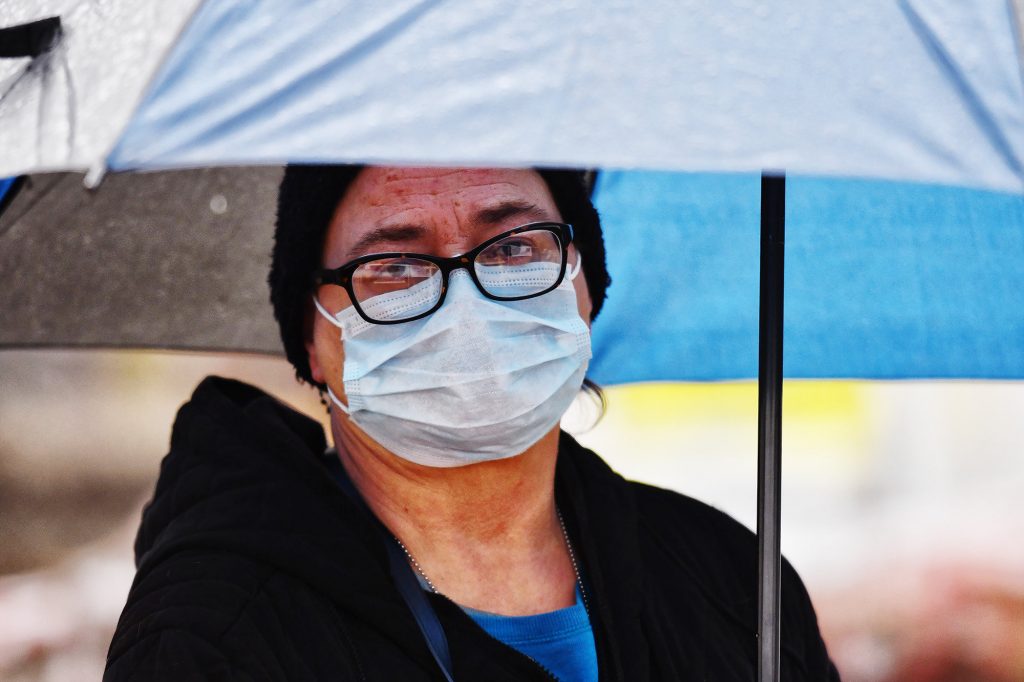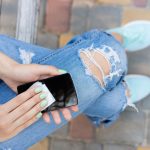BY THE ASSOCIATED PRESS
As the coronavirus pandemic consumes bigger and bigger chunks of everyday life and new guidelines seemed to be rolled out daily, many may be unsure what they should or should not do when it comes to social activities.
On March 8, the Centers for Disease Control recommended public gatherings be limited to 50 people during the next eight weeks. The Trump administration took the guidance a step further, asking that groups be limited to 10 people and discretionary travel be canceled as part of efforts to slow the virus outbreak.
Health experts maintain that social distancing remains the most effective way to slow the spread of the coronavirus.
Here are answers to some commonly-asked questions about making social choices during the outbreak:
Q. What is the risk of getting COVID-19 on an airplane?
A. According to the CDC, the risk from contracting it from the plane is low. It’s your fellow passengers you should watch.
Most viruses and germs do not spread easily on an airplane because of filtering methods and how air circulates in the cabin. Although the risk of infection on an airplane is low, the CDC warns you to stay away from sick passengers and wash your hands often with soap and water for at least 20 seconds or use hand sanitizer that contains at least 60% alcohol.
Being on an aircraft, seated within 6 feet of a traveler with a lab-confirmed infection represents a medium risk, according to the CDC. The 6-foot distance correlates to approximately two seats in each direction.
With that being said, the CDC recommends that travelers at higher risk for COVID-19 complications avoid all cruise travel and nonessential air travel.
The more potent factor, however, will be the airport. Crowded travel settings, like airports, may increase chances of contracting the virus if there are infected people present, according to the CDC.
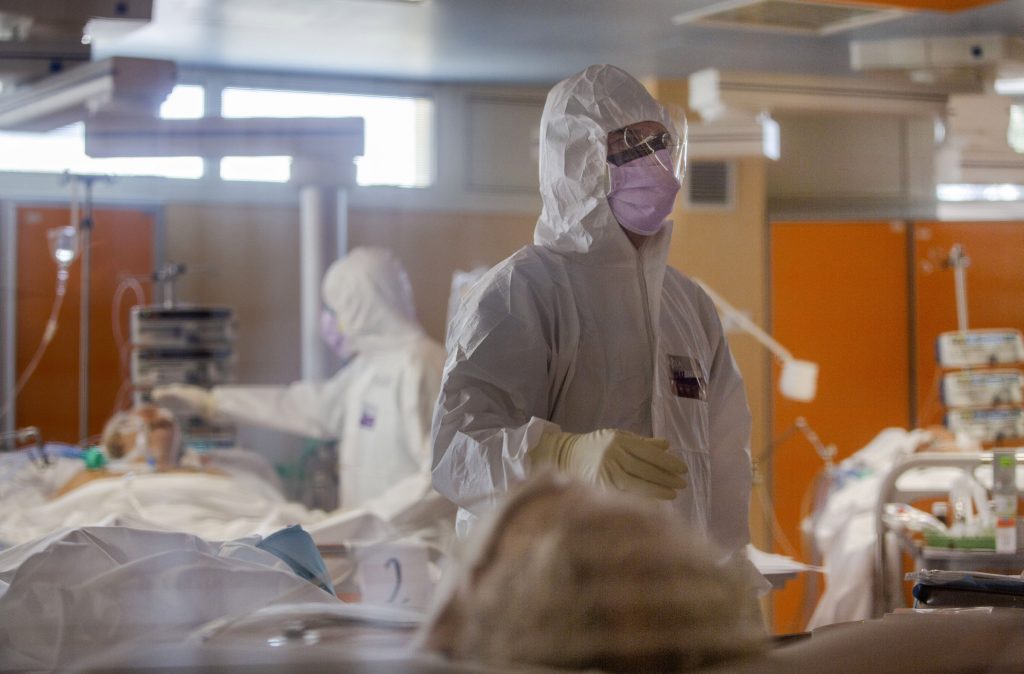
DOMENICO STINELLIS / ASSOCIATED PRESS
Medical staff of the Intensive Care Unit of the Casalpalocco COVID-19 Clinic in the outskirts of Rome tend to patients, Wednesday, March 25, 2020. The new coronavirus causes mild or moderate symptoms for most people, but for some, especially older adults and people with existing health problems, it can cause more severe illness or death.
Q. Can I go for a run or go to the park?
A. Research shows exercise can boost our immune system, and even one workout can help fight off germs, according to a New York Times article. An outdoor workout also can replace going to your gym or fitness club.
In fact, the CDC recommends getting outside as a way to help your children stay active: “Encourage your child to play outdoors — it’s great for physical and mental health. Take a walk with your child or go on a bike ride.”
Q. As we continue to do more and more online shopping, how concerned should I be about handling packages delivered to me? What steps can I take to minimize any possible exposure?
A. This is becoming a more frequently-asked question, particularly as more of us are spending more time at home and leaning heavily on online shopping.
According to the World Health Organization and the CDC, the likelihood of COVID-19 contaminating cardboard or other shipping containers is low.
FedEx, for example, has temporarily suspended a signature requirement for most deliveries in the U.S., and is regularly disinfecting the equipment used to make deliveries, according to the company’s website.
UPS, meanwhile, is not requiring signatures but advises that customers and drivers will have to interact during a delivery.
“The consignee must, at the time of delivery, acknowledge that UPS is making a delivery and, if applicable, show government issued photo ID,” the company states on its website.
In a statement on its website, the U.S. Postal Service stated it is continuing to follow strategies and measures recommended by the CDC in regards to the virus. The CDC, the WHO and the surgeon general have indicated that there currently is no evidence that the virus is being spread through the mail, according to the statement.
Libby Richards, an associate professor at the Purdue University School of Nursing who teaches courses on population health, suggests adding steps to safeguard against exposure from delivered packages.
“I would discourage opening the door for the delivery person; leaving packages on the porch is fine,” Richards wrote in an email. “Out of an abundance of caution … after you open your package, dispose of the box in recycling and wash hands. Avoid touching your face or other hard surfaces until hands are washed. Initial studies do show that the virus can survive on surfaces such as plastic and metal much longer than it can on cardboard.”
And that brings up a similar question.
Q. Should I wipe down all of my grocery products and packaging before bringing them into my home to prevent potential transfer of COVID-19 cells onto my countertops and shelves?
A. Richards: “The risk of virus transmission from food packaging or other packaging is very, very, very low. The best practice is to wash your hands right after going to the store, wash them again after putting groceries away, and wipe down your countertops. I don’t think it is necessary to wipe down each grocery item. I have not been doing that at all. It’s more important to avoid touching your face and keep your hands clean.”
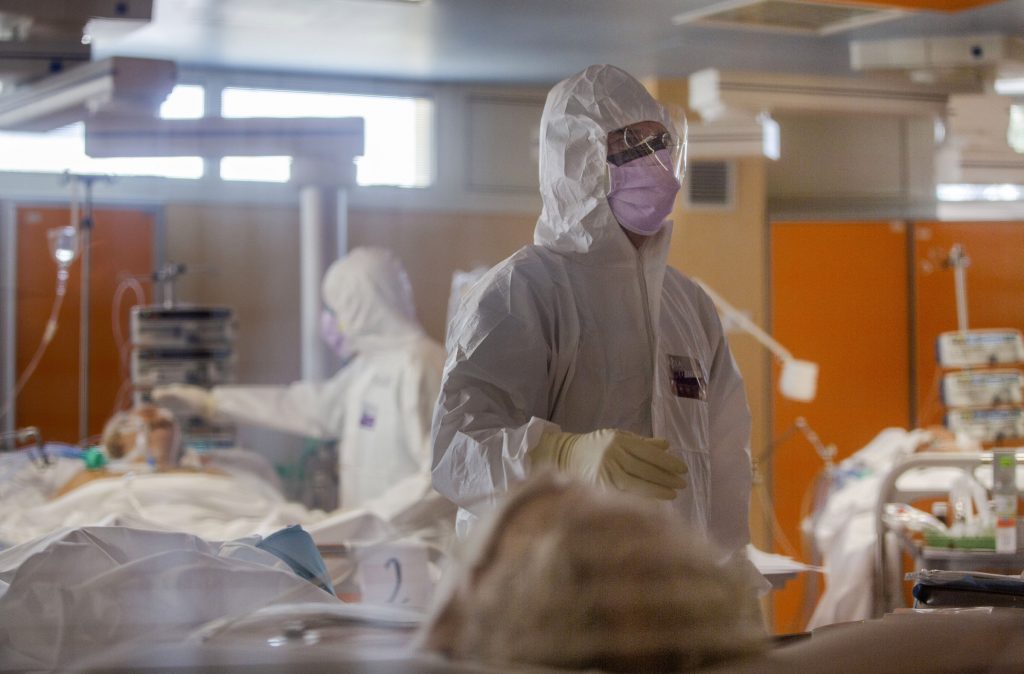
DOMENICO STINELLIS / ASSOCIATED PRESS
Medical staff of the Intensive Care Unit of the Casalpalocco COVID-19 Clinic in the outskirts of Rome tend to patients, Wednesday, March 25, 2020. The new coronavirus causes mild or moderate symptoms for most people, but for some, especially older adults and people with existing health problems, it can cause more severe illness or death.
Q. Can the virus spread through drinking water?
A. No, according to the CDC: “The virus has not been detected in drinking water. Conventional water treatment methods that use filtration and disinfection, such as those in most municipal drinking water systems, should remove or inactivate the virus that causes COVID-19.”
Q. If I’m over 60 years old, can I still go to the grocery store?
A. Richards: “If you have someone who could shop for you, that would be best. If not, consider a grocery delivery service. If that is not an option, try heading to the store earlier in the morning to avoid as many crowds as possible. Carry hand sanitizer with you, if you have it, and clean your hands often.”
Q. Can young people get the coronavirus or are they all just carriers?
A. There seems to be a lot of confusion surrounding the virus’ effects on different age groups.
So to answer the question: Yes. Young people can contract the virus, show symptoms and be hospitalized. They do not simply serve as a potential carriers.
In an analysis released last week of U.S. cases from Feb. 12 to March 16, the CDC reports 38% of those sick enough to be hospitalized were under the age of 55. More specifically, the analysis shows that 20% of those cases were ages 20 to 44. What isn’t clear, however, is how many of those cases involved underlying health conditions or some kind of compromised immune systems.
The report looked at 4,226 cases, with the bulk of the data coming from the outbreaks among older adults in assisted living facilities, according to the Washington Post.
From a broader view, 31% of cases, 45% of hospitalizations, 53% of ICU admissions, and 80% of deaths occurred among people 65 and older, with the highest percentage of severe outcomes among those 85 and older, according to the CDC.
That data matched what was being reported from China, where 80% of deaths have occurred among ages 60 and over.
The CDC further reports that this preliminary data also indicates severe illness leading to hospitalization, including ICU admission and death, can occur in adults of any age.

MATT ROURKE / ASSOCIATED PRESS
Few people travel on North Broad Street in view of City Hall in Philadelphia, Wednesday, March 25, 2020. Philadelphia Mayor Jim Kenney is issuing a stay-at-home order to the nation’s sixth most-populated city to keep its 1.6 million people from leaving home, due to the coronavirus except to get food, seek medical attention, exercise outdoors, go to a job classified as essential or other errands that involve personal and public safety.
Q. How do allergy sufferers differentiate between that and COVID-19 symptoms? And do allergy issues compromise your immune system to the point where you would be more susceptible to COVID-19?
A. Allergy season can wreak havoc on parts of your respiratory system, so paying attention to your symptoms is important.
Richards said the crucial symptoms to watch for are a fever and shortness of breath.
“Allergies typically don’t involve a fever and that is a key symptom of COVID-19,” she wrote in an email. “Shortness of breath is also not as common with allergies, which is another distinguishing feature of COVID-19. In addition, we currently don’t have evidence available that having allergies puts someone at greater risk for complications from COVID-19.”
Q. My elderly mom has been exposed to the coronavirus and the hospital sent her home and told her to stay quarantined for 14 days. If my mom begins to feel a fever or show other symptoms should she return to the hospital or stay home and self-medicate?
A. Richards: “It is totally OK to stay home and use OTC (over-the-counter) medications to treat a fever if she develops one. She will need to call the ER if she begins to have shortness of breath. Shortness of breath is the one symptom that is not always manageable at home. Mild shortness of breath is OK, but if it worsens or she notices a blue tinge to her lips, she should call the ER.”
Q. If I have an A/C or plumbing issue, or need some other service, should I only have the work done if it’s absolutely necessary?
A. It depends on the type of work and your comfort level with having someone inside your home, if that is required. Outside services present more ideal social distancing parameters. You can most likely maintain a 6- to 8-foot distance from the service provider.
Customers should receive a notification, such as an email, that indicates the company’s approach to doing business amid the coronavirus outbreak: “While we usually like to greet our customers with a handshake, we hope a smile and thumbs up will do for now as we strive to keep you, your loved ones, and our technicians healthy and safe.”
AAA, meanwhile, is cleaning its roadside assistance trucks multiple times a day, according to an email sent to members.

LINDSEY SHUEY / STAFF PHOTOGRAPHER
A “no trespassing” sign is posted Monday outside the Hegins Park. Hegins Park and the surrounding facilities have closed because of the novel coronavirus.
Q. Can I give blood if I’m healthy?
Blood centers are safe and giving blood is a great way to help others if you are healthy, according to the White House coronavirus task force’s March 19 midday briefing. The donation centers nationwide are taking care to space donor stations more than 6 feet apart, and they are in need of healthy donors.
Q. Can my kid have a friend over and can they play outside?
A. According to the CDC, children do not appear to be at higher risk for the virus than adults, who make up most of the known cases to date.
With that being said, experts with the Harvard Health Publishing Coronavirus Resource Center recommend play dates be eliminated as a way to create maximum effectiveness for social distancing. Having one friend come over can lessen the risk, the group contends, but only if you can be reasonably sure that the friend is healthy and has had no contact with anyone who might be sick. Then again, without testing, it is impossible to know with certainty if anyone has had contact.
Richards advises against having your child host a friend.
“I wouldn’t because we can’t control the exposures of other people,” she wrote in an email. “Even if your family only visits with one other family, there is no guarantee that your visitors haven’t had additional contacts. In addition, depending on the level of risk of people in your household or immediate family (age or chronic conditions), you need to limit contact with others to protect them. Playing outside in yards is totally OK. Going for bike rides with the family is totally OK. It is doing those things with others outside of your immediate contacts that could be cause for concern.”
Q. I want to take my dog to the park, but even if I practice social distancing, if an infected person has been petting their dog and that dog plays with my dog, can the virus be transferred surface-to-surface (i.e., fur to fur?). If that happened, would I then be at risk when I petted my dog?
A. Richards: “At this time, there is no evidence that companion animals, including pets, can spread COVID-19 or that they might be a source of infection in the United States.
“However, with that being said, there are many high-touch surfaces at dog parks that could still transmit disease such as the gate handle.”
“If you are sick with COVID-19 (either suspected or confirmed), you should restrict contact with pets and other animals, just like you would around other people. Although there have not been reports of pets or other animals becoming sick with COVID-19, it is still recommended that people sick with COVID-19 limit contact with animals until more information is known about the virus. This can help ensure both you and your animals stay healthy.
“So long story short … we don’t have all the answers yet. Out of an abundance of caution, until we know more about what surfaces this virus can live on, I would consider a dog a high-touch surface and limit contact with other dogs, if possible. Dog walks are still totally safe and playing with your own dog is too. Our pets are providing much needed social support at the time.”
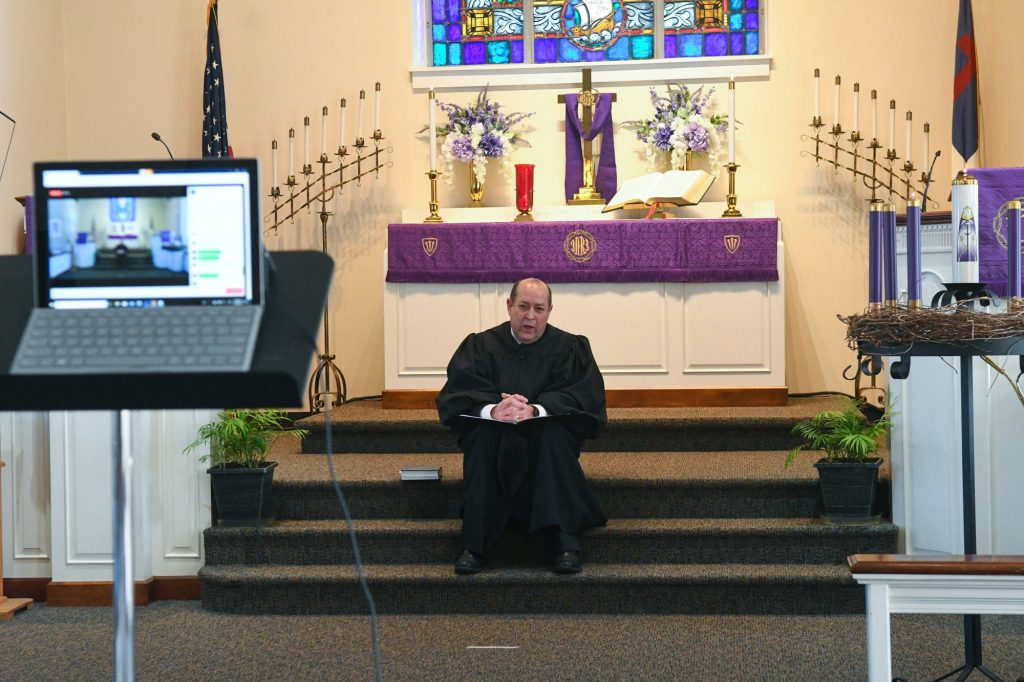
JACQUELINE DORMER / STAFF PHOTOGRAPHER
Pastor Ken McDowell delivers the children’s message live streaming on Facebook from St. Paul’s United Church of Christ Summer Hill on Sunday in Auburn. Because of the coronavirus pandemic, there were no parishioners in the church. They are asked to join together for worship on the church’s Facebook public page at Summer Hill UCC.
Q. Should I cancel my routine dentist or doctor appointment?
A. Richards: “Yes, only essential appointments should be kept. If you need your yearly exam or medication refills, consider calling your healthcare provider and seeing if they will refill medications for a few weeks or months until we get past this.”
Q. Can I get my haircut or have a pedicure or massage?
A. Richards: “I wouldn’t, (as) we don’t yet know how long the virus can survive on surfaces and imagine how many high-touch surfaces there are at salons. Despite best efforts to clean between clients, it’s not worth the risk.”

